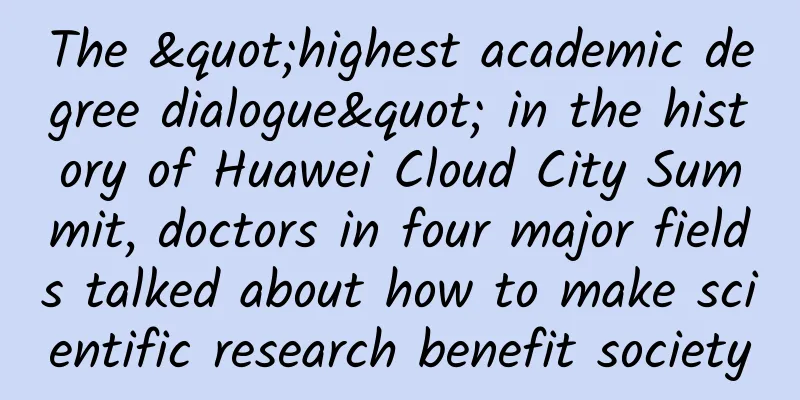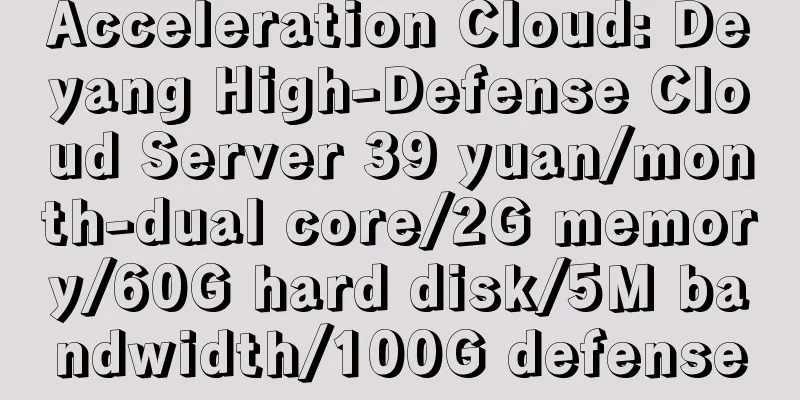The "highest academic degree dialogue" in the history of Huawei Cloud City Summit, doctors in four major fields talked about how to make scientific research benefit society

|
With the popularization of emerging technologies such as 5G , cloud, and AI , all walks of life are using new technologies to achieve intelligent transformation and upgrading. This is especially true for the technology-based scientific research industry, because whether it is the explosion of data volume or the scarcity of AI computing power, it will affect the scientific research industry to varying degrees in improving efficiency, data analysis, real-time data sharing and other aspects of progress. Recently, at the "Shanghai Choose Extraordinary Huawei Cloud City Summit 2019 ", Huawei Cloud and various scientific research institutions in Shanghai held a roundtable forum on " Cloud for Good : Technology Empowering Future Scientific Research", and jointly discussed how to use technologies such as " 5G+ Cloud +AI " to help the development of the scientific research industry, integrate technology into scientific research, and make scientific research benefit society. Dr. Gu Mingjian, researcher at the Shanghai Institute of Technical Physics, Chinese Academy of Sciences and chief designer of the Fengyun-3 infrared hyperspectral atmospheric sounder, Dr. Zheng Guangyong, associate researcher at the Shanghai Institute of Nutrition and Health, Chinese Academy of Sciences, Dr. Liu Haitao from the Shanghai Institute of Computing Technology, and Dr. Chu Pengzhi, deputy director of the IT Center of the Student Innovation Center of Shanghai Jiao Tong University, shared their views at the forum. In the field of remote sensing research, the Shanghai Institute of Technical Physics of the Chinese Academy of Sciences has joined hands with Huawei Cloud and the National Satellite Meteorological Center to build a remote sensing research platform on Huawei Cloud, opening up massive remote sensing data to domestic and foreign researchers, forming an open and efficient remote sensing research service platform and atmospheric remote sensing academic circle. Dr. Gu Mingjian pointed out that meteorological satellite data is playing a greater role in scientific research through the cloud. For example, researchers use cloud and AI technology to improve the efficiency and accuracy of algorithm research. After massive meteorological remote sensing data is accelerated through cloud servers and computing power is improved, researchers no longer spend a lot of time downloading and processing data, but can focus more on algorithm research and maximize the use of remote sensing data. At the same time, the cloud allows more meteorological and environmental protection-related units and enterprises to obtain first-hand data in the scientific research field in a timely manner, thereby providing more accurate weather forecasts and emergency information for the treatment of air / water / soil pollution. In the field of genetics, the Shanghai Institutes for Life Sciences of the Chinese Academy of Sciences uses Huawei Cloud's AI , cloud computing and other technologies to improve the efficiency of biomedical big data analysis. For example, in the "multi-dimensional omics" data analysis in the field of genetics, it is committed to realizing the encapsulation and automation of the analysis process on Huawei Cloud to accelerate the analysis process; at the same time, the "multi-dimensional omics" data integration new algorithm based on the AI framework realizes the efficient mining of massive data. Dr. Zheng Guangyong introduced that in the " BT+IT " (biotechnology + information technology) era, with the help of Huawei Cloud, biomedical research institutions and enterprises can quickly form intelligent data analysis solutions, improve analysis efficiency and accuracy, achieve precision medicine, and help more people get healthy. In the field of medical health, Dr. Liu Haitao introduced that the Shanghai Institute of Computing Technology and Huawei Cloud have cooperated to build a medical AI platform to support doctors in conducting gastric cancer screening for asymptomatic people across the country, and to conduct full health management for patients with early gastric cancer and high-risk gastric cancer, so as to achieve "early prevention, early detection, and early treatment" of gastric cancer. The platform has screened more than 50,000 people at risk of various digestive diseases and screened out more than 20,000 disease patients, including more than 170 early cancer patients, which is equivalent to helping save more than 170 individuals and families. The current early diagnosis rate of the platform is nearly 70% , reaching the international leading level, and has initially formed a risk prediction model for high-risk gastric cancer populations that is suitable for the Chinese population and economically feasible. In the field of higher education, Dr. Chu Pengzhi introduced that Shanghai Jiao Tong University has cooperated with Huawei Cloud in the fields of IoT, network security, big data and AI , and has opened courses to facilitate students' learning and practice. For example, in the field of AI , students can quickly realize their innovative ideas and solve the problems they face through Huawei Cloud ModelArts , HiLens , Atlas and other terminals and cloud resources. Through cooperation with Huawei Cloud, Jiaotong University can continue to lower the threshold of AI education and promote AI technology. Not only Jiaotong University, but also schools in other regions are following this model. In the end, Huawei Cloud has achieved universal access to the AI industry, and major universities have achieved universal access to AI education. Goodness is the eternal pursuit of mankind. Huawei Cloud has put forward the concept of " Cloud for Good ", hoping to use the power of technology to help everyone, every family, and every organization create extraordinary value and contribute to society. Huawei Cloud City Summit 2019 has gone through 18 stops, and Huawei Cloud Cloud for Good has never stopped - in Shenzhen, it joined hands with medical companies to launch the "rational blood donation and scientific blood use" action initiative; in Chengdu, it established the Sichuan-Tibet "hundreds of millions" cloud, big data, and intelligence talent development plan; in Suzhou, it cooperated with partners to achieve pollution prevention and control and protect green mountains and rivers; in Guangzhou, it released the Guangdong Province Science and Technology Small and Medium Enterprises Cloud Support Plan; in Xiamen, it jointly launched the construction of smart medical joint actions with Xiamen Municipal Health Commission and others; in Chongqing, Xi'an, Kunming, and Hefei, it launched the Kunpeng talent training plan with universities; in Wuhan, it joined hands with enterprises to promote the informatization of the genetic industry for the benefit of human health. Assisting scientific research and innovation is a microcosm of Huawei Cloud's practice of the Cloud for Good concept. In the future, Huawei Cloud will share its own technology with more scientific research institutions, further lower the threshold for acquiring emerging technologies such as 5G , cloud, and AI , and enable scientific research results to be converted into products and services more quickly, benefiting more people.
|
>>: Hundreds of unicorns died in 2019: 3 reasons, 5 traps, and a mess
Recommend
Analysis of API Gateway Selection of Several Major Cloud Vendors
1. What is an API Gateway? An API Gateway is a wa...
When to use 5G and when to use Wi-Fi 6
[[357301]] 5G is a cellular service, and Wi-Fi 6 ...
The acceleration of 5G NR standardization will have a significant impact on operator plans
Ovum said that the recent decision by 3GPP to acc...
Cisco ASAP helps you to subvert the traditional architecture by starting the full digital transformation of data center
[51CTO.com original article] Enterprise digital t...
Huawei's ecosystem is expected to prosper exponentially in response to demand
【51CTO.com original article】 As we all know, in t...
Juniper Networks combines Mist AI with Intelligent Session SD-WAN and SRX secure branch gateways to deliver the best user experience from client to cloud
As a leader in providing AI-driven secure network...
A brief discussion on WebSocket interface testing
What is WebSocket WebSocket is a protocol based o...
If the TCP protocol is used, will there be no packet loss?
Data packet sending process First, the green chat...
At the Huawei Maimang 8 launch event, He Gang of Huawei said that the greater the challenge, the greater the achievement
At the launch of Huawei Maimang 8 mobile phone, t...
Key Points in CCIE Exam - MPLS VPN Technology
MPLS VPN technology is a key point in the CCIE ex...
5G has nothing to do with WiFi
A quick note: the Wi-Fi that all of our connected...
In the 5G era, what is the way out for the three major operators that are crying poor?
As 2017 was coming to an end, news about 5G becam...
RedCap chip debuts as scheduled, accelerating the 5G IoT industry
Recently, Qualcomm announced the launch of the wo...
RackNerd: $60/year - 1.5GB/20GB/3TB/5IP/6 data centers available including Seattle
In addition to the special annual VPS that we oft...









